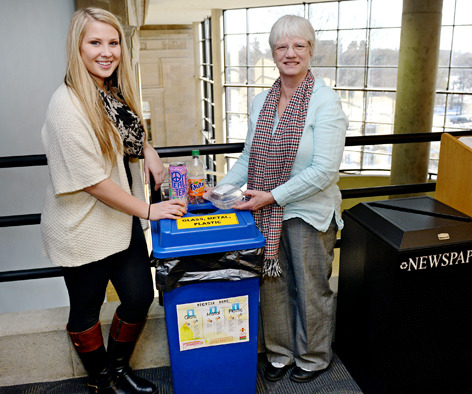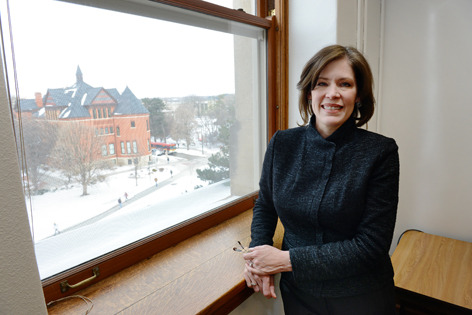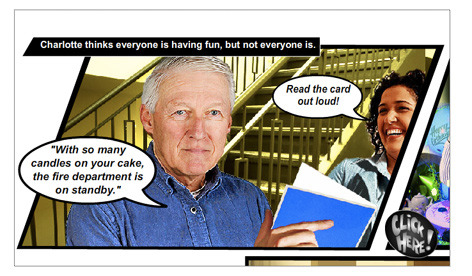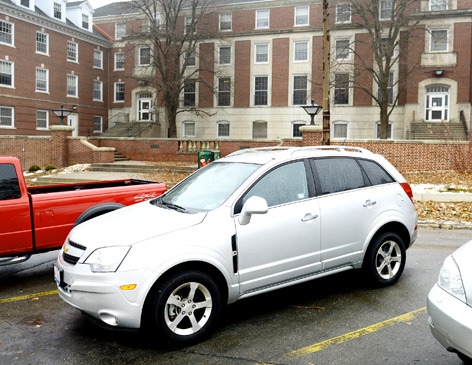Library is testing food/beverage container recycling through January

Junior Alyson Straube (left) and library associate professor Kathy Parsons are behind a six-week test to recycle beverage and food containers in the library. Photo by Amy Vinchattle.
As a high school student in Racine County, Wis., she used to move her friends' soda bottles from the trash to a recycling bin, so Alyson Straube knows how to 'walk the walk.' The chemical engineering junior thinks the Government of the Student Body's director of sustainability post is a great fit for her interests.
"I wanted this position to try to make a difference," she explained. "We [Iowa State] do a really good job with sustainable projects, but the more we can do, the better."
Parks Library is testing another recycling program – with plastic, metal and glass food and beverage containers – through Jan. 31, thanks to work this fall by Straube.
How it works
Facilities planning and management provided the blue 32-gallon covered plastic bins for the food and beverage container recycling. One was added to each of the library's four floors, strategically placed next to that floor's newspaper recycling bin. Straube and a handful of student volunteers from The Green Umbrella student organization will empty the bin liners when they're full and carry the recyclables to an outdoor holding container at the Hub.
Items suitable for the new blue bins are:
- Clear and colored glass bottles
- Plastic bottles and food containers Nos. 1-7 -- including many microwave meal containers
- Tin and aluminum cans
If you're unsure, read the guidelines on the recycling bin. Aluminum foil and plastic tableware (spoons, forks) aren't accepted for recycling. Ideally, all containers are empty.
As of July 1, Iowa State has a new vendor for its recycling contract, Ames Area Redemption Center. Its staff is collecting recycled materials from building loading docks. For the first time, the university is receiving a small fee -- ranging from $2 to $10 per ton -- for most of its recyclables. Currently, there is no charge for food and beverage recyclables.
High-traffic test
Straube said she targeted the library because it's a high-traffic building and because it has a café on site that generates lots of containers.
Library associate professor Kathy Parsons, who heads the building's access services, said higher enrollments have placed a bigger demand on Parks Library. The building is averaging just over 10,000 visitors each weekday this fall.
"We've seen an increase in trash in the building," Parsons said. "They're not any messier, there's just more people using the building and more trash.
"To her credit, Aly noticed that lots of it could be recycled," she added.
Parsons will monitor the recycling containers over the winter semester break to keep the pilot project active.
Like the university's white paper and mixed paper recycling programs, food and beverage container recycling is a self-service program; that is, building residents have to use their indoor bins and periodically empty them to an outdoor container where the materials can be picked up.
"If this test goes well, and the fact that it's free to the building, I'm hoping it will be easy to sell to the building people later this winter," Straube said.
Other recyclers
The library is not the first building to recycle food and beverage containers. It joins General Services, Physics, Zaffarano and Carver halls (2012), Spedding and Wilhelm halls, Metals Development and TASF (early 2013), and Beardshear Hall (September).
Director of facilities services Bob Currie said FPM will provide recycling containers for other campus buildings where there's an interest.
"The big thing is that people need to want to do this, since it's a self-service program," he said. "Each building needs its own cheerleader."
Work units that want to add another recycling option in their area and need additional containers should contact Currie, 4-1875, or recycling coordinator Sue Mallas, 4-0692, to get started.
Welcome

Julie Nuter (NEW-ter) joined Iowa State Dec. 2 as associate vice president for university human resources. Her responsibilities include organizational development and review, performance management, employee and labor relations, compensation, recruitment and benefits.
Nuter comes to Iowa State from DePaul University, Chicago, where she most recently served as associate vice president of human resources.
Nuter's office is in 3750 Beardshear. She can be reached at 4-6866 or jnuter@iastate.edu.
Online training on harassment, Title IX an easy, useful read

The new online training sessions on discrimination and harassment and Title IX are a "must-see" in more ways than one.
- They're required for all faculty and staff
- They show you how to stay on the right side of discrimination and harassment laws
- They're engaging
An entertaining cast of characters -- office mates, faculty and students -- pop in and out of the lessons, providing examples of the kinds of behavior you might encounter in the office or on campus. Many of these vignettes are based on real-life incidents, and are accompanied by mini-exercises that allow you to test your responses to problematic situations. The result is a 40-minute interactive session that seems much shorter and leaves you better equipped to deal with harassment and discrimination on campus.
If your office workload is slowing somewhat as the holidays approach, now might be a good time to start the training. Here's what you need to know:
Training is required for all faculty and staff
President Steven Leath has called on all faculty and staff to complete the online discrimination and Title IX training over the next couple of months. The goal of the training is to ensure that Iowa State provides a supportive, inclusive environment for all.
Training in these areas also helps to fullfill requirements by two federal agencies -- the Equal Employment Opportunity Commission and Office of Civil Rights.
Training topics
Training covers Title IX of the Educational Amendments Act of 1972; Titles VI and VII of the Civil Rights Act of 1964; and Iowa State's discrimination and harassment policy and policy on sexual misconduct, assault and sexual harassment involving students.
All faculty and staff will take two courses:
- Unlawful Harassment Prevention
- Title IX and Violence Prevention
Supervisors will take a third course, "Unlawful Harassment Prevention Supervisor Supplement for Higher Education Faculty or Staff."
A key focus of the training is helping you know what to do if you encounter discrimination or harassment, including sexual harassment.
How to get started
You should have received an email Dec. 3 that lists the sessions you need to take and provides a unique link to your training space. Keep this link. You'll use it to access your training. You can start and stop training sessions at will. If you lost the email with your training link, send an email to:
- The office of equal opportunity at eooffice@iastate.edu or
- Robin Kelley, director of the office of equal opportunity, at rkelley@iastate.edu
Completing the training
You'll have an opportunity to print a training certificate after completing each session. You needn't forward these certificates to administrators but, if you like, you can keep for your own records. Your course completion will be electronically recorded.
Once you've completed the training sessions, you may want to retain your customized link. Kelley said the sessions will remain available as a handy reference for faculty and staff through early December next year.
Questions
If you have questions about the training, contact Kelley, who worked with Workplace Answers and campus stakeholders to customize the online training module for Iowa State.
Third shared vehicle delivered to campus

The latest addition to the CarShare fleet, a silver Chevrolet Captiva, purposely does not feature program logos or markings. It is parked north of Linden Hall (in the background) on the east side of campus. The third parking spot is west of Frederiksen Court. Photo by Amy Vinchattle.
Iowa State began the third year of a three-year contract with Enterprise Rent-A-Car's CarShare program (formerly called WeCar). Membership in the rent-by-the-hour driving option is up to 166 individuals as of October, a 40 percent increase from November 2012.
Enterprise, which tracks vehicle use, added a third vehicle to the ISU fleet last month. Vehicles now are available in the Martin Hall lot (Ford Focus sedan), Richardson Court drive (Chevrolet Captiva SUV) and the new residence lot west of Frederiksen Court on Stange Road (Ford Focus sedan).
Rental rates -- which include insurance and fuel -- remain unchanged from the first year of the contract:
- $8/hour on weekdays
- $8.50/hour on Saturdays and Sundays
- $35 overnight (6 p.m.-8 a.m.)
- $56 for 24 hours
Each rental period includes 200 miles; additional miles are 20 cents per mile.
All CarShare business is conducted online, including membership and reservations. Members receive an electronic key card, which, when swiped across the CarShare windshield, unlocks and locks the doors. The ignition key and a gas card are stored in the vehicle.
CarShare monthly averages (per vehicle)
Iowa State, Nov. 2012-Oct. 2013
|
Reservations |
28.5 |
|
Miles driven per reservation |
67 |
|
Billed driving hours |
209 |
Senate looks at changes to academic programs, handbook policies
Members of the Faculty Senate closed out the fall semester by unanimously approving a pair of new programs and shuttering another. An additional program discontinuation and a slew of policy revisions await senate decisions in 2014.
The four curricular items approved at the Dec. 10 meeting include:
- A name change for the public service and administration in agriculture degree program, to agriculture and society (sociology department and College of Agriculture and Life Sciences)
- A new minor in food and society (food science and human nutrition department)
- The discontinuation of the master of agriculture degree program (agricultural education and studies department)
- A new master of engineering in energy systems engineering, offered online and on campus (College of Engineering)
Five docket items were introduced for senate consideration and will be voted on in January, including:
- A request to discontinue the College of Liberal Arts and Sciences' master of public administration degree program. A minimum three-year phase out of the program is recommended, in order to accomodate students admitted to the program. Students also may switch to a new political science master of arts degree without any loss of credits.
- Revisions to Faculty Handbook section 9.3.3, which outlines the appointment of an ad hoc investigative committee (AHIC) for faculty grievance cases. The change adds language to ensure "consideration to the diversity of the AHIC."
- Revisions to Faculty Handbook chapter seven, which contains the faculty conduct policy. Dale Chimenti, member of the judiciary and appeals council, said the changes clarify and streamline procedures for faculty misconduct proceedings. Details also were added to the section (7.2.2.5.2), providing guidelines to handle abandonment of position.
- Revisions to Faculty Handbook section 5.4.1, which outlines eligibility criteria for the evaluation of non-tenure eligible (NTE) positions. The language clarifies that both full- and part-time NTE faculty can be considered for advancement after a minimum of six years or 12 semesters (or its equivalent) of employment.
- Revisions to Faculty Handbook chapters seven (faculty conduct policy) and eight (university community policies), primarily the conflict of interest portion of the policies. John Cunnally, chair of the governance council, said the changes eliminate contradictions and ambiguity, and "conform with the language and intent" of information in the university's policy library.
Other business
- Senate president Veronica Dark said the senate is working with the Government of the Student Body to create an online module. The resource, which she said should be in place next fall, would answer student questions about the university, such as an explanation of tenure, what faculty work on outside the classroom or how student evaluations are utilized.
- Senior vice president Warren Madden recapped the events surrounding the Nov. 4 police chase that ended with shots fired on central campus. He said a review of the procedures and processes is ongoing, but "in general, things worked as well as they could and should."
- Senate president-elect Kevin Schalinske said the spring faculty conference, "Online Education," is planned for April 22 in the Memorial Union Great Hall. The program will run from 8 a.m. to noon, followed by lunch.
- Senators unanimously approved the fall graduation list, which included 1,499 undergraduates and 334 masters and doctoral students.
'Tis the season ...

What better way to celebrate the holidays than taking in a performance of The Nutcracker Ballet? Iowa State Center will present its 33rd annual production of this holiday favorite Dec. 14 (1:30 and 7:30 p.m.) and Dec. 15 (1:30 p.m.) at Stephens Auditorium.
The Nutcracker Ballet tells the story of a young girl, a heroic prince and the fantastic dream they share. From the opening party scene to the last notes of Peter Tchaikovsky’s famous score, a festive spirit permeates the whole performance.
Ames native Joy Voelker Matossian, a professional dancer who now resides in New York City, will perform the role of the Sugar Plum Fairy. Justin Koertgen, a professional dancer from Michigan, will dance the part of her Cavalier. In addition, more than 200 local performers from area dance studios will take the stage as part of this holiday classic.
Tickets, $20 and $25 (discounts available for youth, ISU students, seniors and groups of 10 or more), are available at the Iowa State Center ticket office or through Ticketmaster. Submitted photo.
